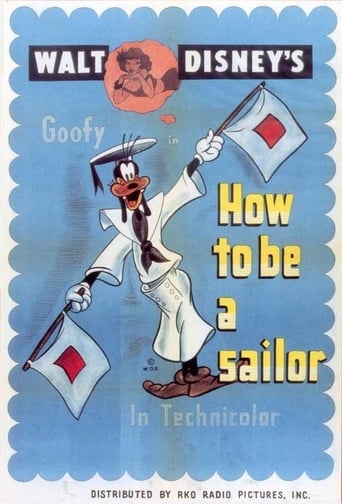morrison-dylan-fan
After having been surprised at the sudden change in direction in Disney's series of Goofy's shorts,with the movies now being made to help the US war effort,I started to become very interested in seeing where Goofy would go in his second "war era" short.The plot:Showing a caveman figure out how to cross a river by oar,the film then follows Goofy as he takes part in some of history's most famous navy adventure.View on the film:Moving at an astonishing pace,the screenplay,(written by sadly un-named writers) does not waste waste a single minute,as the film goes from hilariously showing a caveman Goofy (!) and an oddly,Christopher Columbus lookalike Goofy,to Goofy taking on the Japanese.Whilst some moments of the movie are…less then PC, (Goofy destroys the flag of Japan!)director Jack Kinney takes a delightful slap-stick approach with the animation,as Goofy goes from being a rather dim witted caveman,to finding himself accidentally walking the plank.
TheLittleSongbird
Goofy is such an appealing and versatile character, not to mention funny, and the How to...make for enormous entertainment. And it is difficult not to be entertained by How To Be a Sailor. The animation is colourful and how it's coloured/shaded and how fluidly drawn it was gives it a charm that still holds up. The music is orchestrated in a way that creates a beautiful sound and blend, it also has great energy. As with all the entries of the How to...shorts, How to be a Sailor's humour is also very winning and as with the best of them is a perfect match with the animation. The ending especially is hilarious(with the flags, knots and sea legs parts being equally good), though how Goofy acts is funny and endearing brings at least a big smile to the face. Goofy is an example of a character that grew with every short he starred in, as well as being effortlessly funny in how he demonstrated skills in the wrong way and instantly appealing that's what makes his character so great. What's also great is how in multiple character roles he plays he plays each different but you can still tell it's him. How to Be a Sailor also feels like a How to...short, the spirit of what makes the series so good, Goofy's demonstrations, the documentary-like narration and how it incorporates its messaging are all here and to great effect. The narration is sardonic and informative, helped by thoughtful delivery from John McLeish. All in all, another winner in a series that is still hugely entertaining and well made. 10/10 Bethany Cox
Shawn Watson
This is actually a rather funny cartoon that details the history of man on the oceans. From the first log and paddle to the battleships of today. All demonstrated by Goofy and for once he's entertaining. The narration is quite sarcastic and makes fun of Goofy at every turn. He's just an ordinary sailor up to endless hijinks on the seas. But, being a war propaganda cartoon it does turn to Xenophobia at a certain point. In once scene Goofy is fired out as a torpedo and blows up several 'Jap' submarines. The manner in which this is delivered to us would NEVER be allowed today. Even in the current political climate, Disney wouldn't produce a cartoon like this. Still, it's funny and full of silly humor.
Ron Oliver
A Walt Disney GOOFY Cartoon.Goofy demonstrates HOW TO BE A SAILOR in the worst possible way.Some practical information may be gleaned between the laughs in this funny little film. The viewer learns about the origin of the paddle and the oar, navigating by the stars, pirates, semaphore flags, knots & the hornpipe. The story ends on an appropriately patriotic note, as befits this wartime cartoon. John McLeish narrates in his best documentarian manner.Walt Disney (1901-1966) was always intrigued by pictures & drawings. As a lad in Marceline, Missouri, he sketched farm animals on scraps of paper; later, as an ambulance driver in France during the First World War, he drew comic figures on the sides of his vehicle. Back in Kansas City, along with artist Ub Iwerks, Walt developed a primitive animation studio that provided animated commercials and tiny cartoons for the local movie theaters. Always the innovator, his ALICE IN CARTOONLAND series broke ground in placing a live figure in a cartoon universe. Business reversals sent Disney & Iwerks to Hollywood in 1923, where Walt's older brother Roy became his lifelong business manager & counselor. When a mildly successful series with Oswald The Lucky Rabbit was snatched away by the distributor, the character of Mickey Mouse sprung into Walt's imagination, ensuring Disney's immortality. The happy arrival of sound technology made Mickey's screen debut, STEAMBOAT WILLIE (1928), a tremendous audience success with its use of synchronized music. The SILLY SYMPHONIES soon appeared, and Walt's growing crew of marvelously talented animators were quickly conquering new territory with full color, illusions of depth and radical advancements in personality development, an arena in which Walt's genius was unbeatable. Mickey's feisty, naughty behavior had captured millions of fans, but he was soon to be joined by other animated companions: temperamental Donald Duck, intellectually-challenged Goofy and energetic Pluto. All this was in preparation for Walt's grandest dream - feature length animated films. Against a blizzard of doomsayers, Walt persevered and over the next decades delighted children of all ages with the adventures of Snow White, Pinocchio, Dumbo, Bambi & Peter Pan. Walt never forgot that his fortunes were all started by a mouse, or that childlike simplicity of message and lots of hard work always pay off.
